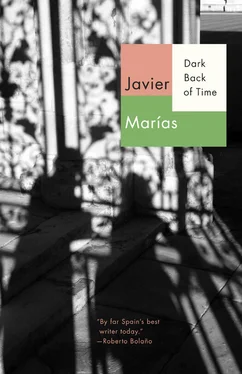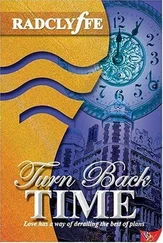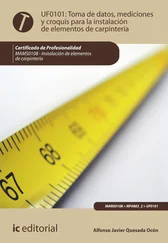Eric and Ian laughed as well, aspirating their consonants as they did so. Ian Michael wrote detective novels featuring an inspector named Bernal, but only to enjoy himself and make money in Japan (apparently the trick is to have five or six books with the same character and then success and addiction arrive automatically, especially in Japan with its fondness for repetition, or so they say), and he did not count on occupying a place in the history of literature. Neither did I, with my non-detective novels. Or maybe I do, it isn’t an easy thing to say. No, what I aspire to is something else.
“I don’t think there’s much danger of that,” I answered Toby. “If it depends on me, I’m afraid all of you are going to have to go on being mortal.”
I must make a digression — this is a book of digressions, a book that proceeds by digression — to admit that I’ve occasionally put Toby Rylands’ idea to use as a persuasive measure or bargaining tool. Once, while still writing All Souls , I convinced Francisco Rico himself of what the eminent gentleman from New Zealand had banteringly formulated in Ian Michael’s garden while watching the river. To me, at that time, Paco Rico was “Professor Rico, man of vast knowledge,” laboriously disdainful, insolent in his vanity and congenial in spite of himself, a complacent man who liked to surround himself with acolytes (and did so). On one occasion, nevertheless — it may have been in Vitoria — I managed to depress him by pointing out that all his professorial prestige and fanfare, his potential halo as a member of the Real Academia Española de la Lengua — he was pushing his candidacy — and his many acclaimed critical writings were destined to last only as long as he did. After him would come others who were by definition more competent, more informed and more advanced in their methodologies, individuals who might well manage to find out all there was to know about Lazarillo de Tormes , for example, or the Quijote , and who would render his interpretations and discoveries outdated or even absurd in their naiveté—the past always seems naive — and ignorance of new and fundamental information. On the other hand, it can be stated, I told him, that every contemporary novelist — even the most inept of us, the one from Manzaneela de Torio, or the one from Quicena, among the Spaniards; no, it has to be the one from Las Palmas — is in some way superior to Cervantes, though only because we know Cervantes and have his lessons and can rely on him, and what’s more we know what has come along in his wake, which in theory gives us a great advantage; yet none of us are better than him, neither our existence nor our pages erase or annul his, which continue to be studied and read without ever becoming outdated or invalid; this is a field in which the passage of additional time doesn’t advance or improve or determine the course of what came before; it may be the only field in which time past is not lost but won, not for individuals — we are always losing time — but for our intentions and the body of work we create, if it does last. No one pays any attention to what we write today, but there is a remote possibility that people like Rico may do so many years from now, or people like Rylands, or Michael, or Southworth, and that will never happen to what Professor Rico himself delivers to the presses today, however great its value and merit.
“It’s possible,” I told him, “that you may be remembered more for having appeared as a character in a novel so enduring that it will be pored over throughout eternity, than for anything it lies within your power to achieve, with all your assiduity and expository talent and all the knowledge you’ve amassed.”
At first the professor made a show of disdain, as was his practice, and even looked a bit piqued.
“Bah,” he said, with a haughty pout. “I’ve already appeared in a novel, as the one and only protagonist, the central and dominant character, the catalyst of the action and, above all, of the passion. An entire novel written against me by a woman, poor thing, to work through her heartbreak.”
“Yes, I’ve read it,” I answered, which appeared to surprise and furthermore to gratify him. (“Really? You’ve read it?” he couldn’t help saying, unable to conceal his delight, and that made me think that Rylands was on to something.) “But you didn’t come off very well, which I suppose is natural since it was written to settle a score with you. Nor were you particularly recognizable, physically enhanced to make the ridiculous passion more credible. You were taller, I think. And in general a loathsome and clichéd character, if I recall correctly, professor. Papier maché.”
The professor had the audacity to defend his achievement anyway; he’s not a man to give in easily, only when he’s grown bored with the argument.
“Don’t be impertinent, young Marías. I came off terribly, but in any case it was obvious she had suffered a great deal over me and that makes me interesting. Doesn’t it?”
“Young Marías”: that’s what Don Juan Benet and a few other friends have long been in the habit of calling me, to differentiate me from my estimable father, who is also a writer though not of fiction. I can well imagine that forty years from now there will still be someone who, on seeing me walk into a room, will say, “Here comes young Marías,” and when the others turn around they’ll see an eighty-five-year-old man; I’ve grown used to the idea and even to the scene, there’s no way around it, names can do so much. Nowadays Rico calls me “Javier” and I call him “Paco,” but at that point we didn’t know each other as well and went by other names, “young Marías” and “Professor Rico, man of vast knowledge.”
“Not very,” I answered. “Making people suffer is the easiest thing in the world, it lies within anyone’s power, the biggest fool or idiot, the most ordinary man and the least mysterious woman. In fact, everyone makes everyone suffer, a little or a great deal but always to some degree, even the people who are good to us and take care of us, contact is all it takes. And then, inevitably, there’s the other person’s disgust which is sometimes apparent and always makes you suffer, doesn’t it? But that’s not the point, nor does it matter whether, as a fictional character, you’re made to seem more interesting than you are. The point is to be a character in an immortal book, if such a thing can happen today; even if you come off looking like a heartless brute, a rat, a moron. Of course it’s best not to come off like that, because you’ll appear in that light until the end of literature, but being left out would be even worse. At least that’s what a foreign mentor of mine thinks. Tell me, do you think that little novel about you is going to last?”
The professor was pensive a few seconds, not wondering what his answer should be but whether he should give one. He pursed his elastic and continually fluctuating lips.
“Frankly,” he said at last, “I’m sure not one reader will ever think of it again after putting it back on the shelf. If they read it to the end. I’m surprised you remember it.”
“I don’t remember much any more, and only because I know you, professor. And there you have it,” I said. “You need a more solid author, one with a better chance of lasting. It’s not that I think my chances are all that great, but in the end it wouldn’t be a bad idea for you to put your chips on some more promising numbers.” The professor is so deliberately vain that you can only feel comfortable with him if you’re as tractable as his acolytes or match him with a vanity of your own, be it forced or false: he takes it very well, feels right at home, on solid ground, and sees it as an invitation to give himself free rein, in some respects he has a childish disposition, excessive in its gratitude. “I’d like to propose a deal.”
Читать дальше












